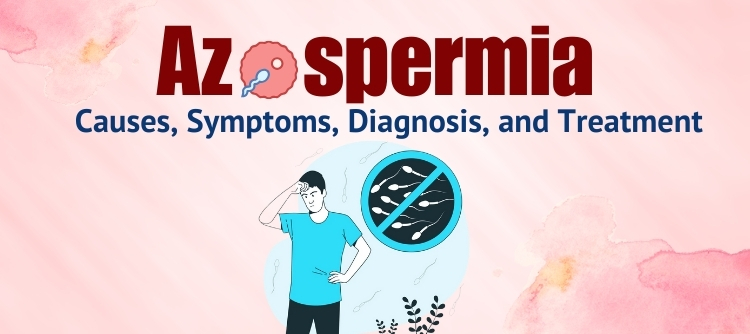Azoospermia: Causes, Symptoms, Diagnosis, and Treatment

Azoospermia is a medical condition characterized by the absence of sperm in the ejaculate, which can be a significant cause of male infertility. Understanding the causes, symptoms, diagnosis, and treatment options for azoospermia is essential for affected individuals and couples trying to conceive. This article will also highlight the available options for male infertility treatment in Jaipur and the services offered by leading IVF doctors.
What is Azoospermia?
Azoospermia occurs when there is no measurable amount of sperm in a man’s ejaculate. There are two primary categories into which this ailment falls:
- Obstructive Azoospermia: Caused by a blockage in the reproductive tract that prevents sperm from being ejaculated.
- Non-Obstructive Azoospermia: Caused by a failure in sperm production due to issues within the testes.
Causes of Azoospermia
Obstructive Azoospermia
- Vasectomy: A surgical procedure for male sterilization that cuts or blocks the vas deferens.
- Epididymal Blockage: Blockage in the epididymis, where sperm mature and are stored.
- Congenital Absence of the Vas Deferens (CAVD): A condition where the vas deferens is absent from birth, often associated with cystic fibrosis.
Non-Obstructive Azoospermia
- Genetic Disorders: Conditions like Klinefelter syndrome or Y chromosome microdeletions can affect sperm production.
- Hormonal Imbalances: Issues with hormones such as testosterone, FSH, and LH can impact sperm production.
- Testicular Damage: Injury, infection, or radiation therapy can damage the testes and affect sperm production.
- Varicocele: Enlarged veins in the scrotum that can raise the temperature in the testes, impairing sperm production.

Symptoms of Azoospermia
Azoospermia itself does not cause noticeable symptoms but is usually discovered during fertility evaluations. However, underlying conditions causing azoospermia might present with symptoms such as:
- Testicular Pain or Swelling: May indicate infection or varicocele.
- Erectile Dysfunction: Can be associated with hormonal imbalances.
- Low Sex Drive: Often linked to hormonal issues.
- Visible Varicocele: Enlarged veins in the scrotum may be noticeable.
Diagnosis of Azoospermia
A physical examination, specialized tests, and medical history are used to make a diagnosis.
- Semen Analysis: Verifies if there are no sperm in the ejaculate.
- Hormonal Testing: Measures levels of testosterone, FSH, and LH to identify hormonal issues.
- Genetic Testing: Detects genetic disorders that might be causing azoospermia.
- Testicular Biopsy: Determines whether sperm production is occurring within the testes.
- Scrotal Ultrasound: Identifies structural abnormalities like varicocele or blockages.

Treatment of Azoospermia
The nature and etiology of azoospermia determine the available treatment choices.
Obstructive Azoospermia
- Surgical Treatment: Procedures like vasovasostomy or vasoepididymostomy can remove blockages and restore sperm flow.
- Sperm Retrieval Techniques: Techniques such as testicular sperm extraction (TESE) or percutaneous epididymal sperm aspiration (PESA) can retrieve sperm directly from the testes or epididymis for use in assisted reproductive technologies (ART).
Non-Obstructive Azoospermia
- Hormonal Therapy: Medications to balance hormones and stimulate sperm production.
- Lifestyle Changes: Improving diet, reducing stress, and avoiding harmful substances can sometimes improve sperm production.
- ART: For severe cases, IVF with intracytoplasmic sperm injection (ICSI) using retrieved sperm can be an effective treatment.
Seeking Professional Help
If you suspect azoospermia, consulting with a specialist in male infertility treatment in Jaipur is crucial. Leading IVF doctors offer comprehensive evaluations and personalized treatment plans. These professionals can guide you through the diagnosis process, explore treatment options, and provide support throughout your fertility journey.
Conclusion
Azoospermia is a significant cause of male infertility, but with the right diagnosis and treatment, many men can still achieve fatherhood. Understanding the causes, symptoms, and treatment options is the first step toward addressing this condition. If you are experiencing infertility issues, seeking help from an experienced IVF doctor in Jaipur or a specialist in male infertility treatment in Jaipur can provide the necessary support and expertise to navigate this challenging condition and achieve your fertility goals.
